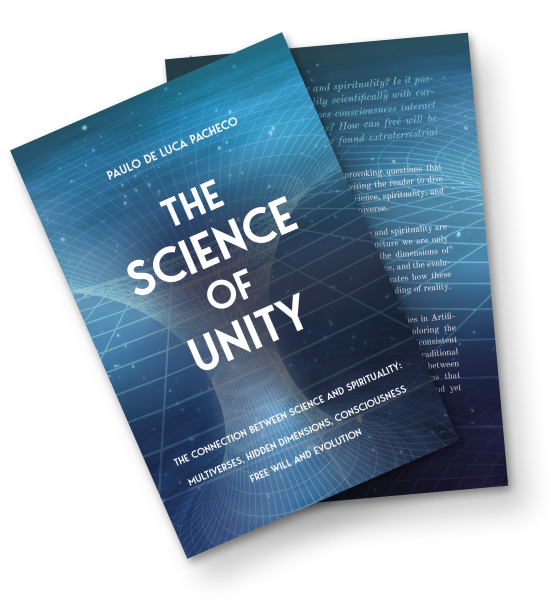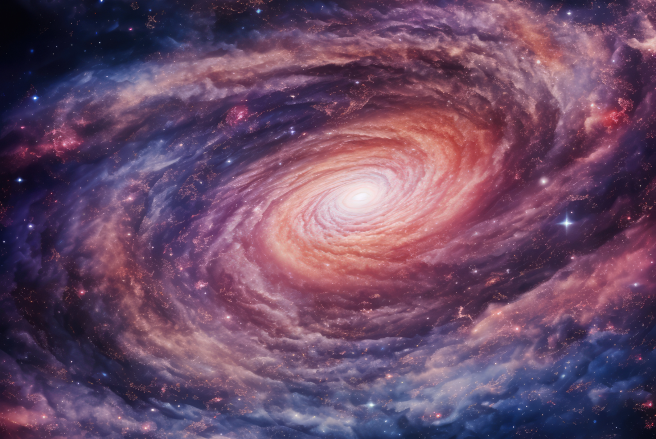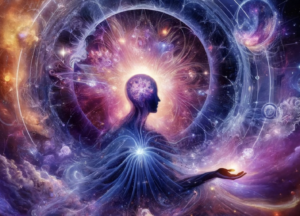Explore new perspectives on time, space, and the dimensions of the universe
Discover how these concepts intertwine to offer an innovative view of reality.
How consciousness interacts
with multiple dimensions
in time and space?
It is possible to model the
spirituality scientifically
with current knowledge?
How free will can be
real? And why haven’t we found extraterrestrial life yet?
These are some of the thought-provoking questions that The Science of Unity proposes, inviting the reader to delve into an integrative vision between science,
spirituality and the multidimensional reality of the universe.

What if you could open the doors to a new reality on the material plane?
By investigating the dimensions of the universe, the relativity of time and space, and the evolution of consciousness, the author demonstrates how these fields intertwine to offer a deeper understanding of reality.
How consciousness interacts
with multiple dimensions
in time and space?
It is possible to model the
spirituality scientifically
with current knowledge?
How free will can be real? And why haven’t we found extraterrestrial life yet?
These are some of the thought-provoking questions that The Science of Unity proposes, inviting the reader to delve into an integrative vision between science,
spirituality and the multidimensional reality of the universe.

Exploring the Interconnection of Realities
In this book, the author transcends traditional paradigms, presenting science as a gateway to new dimensions of knowledge. Uncover the uncertainties that challenge causality and discover how they reveal the complexity of universal unity.
In this book, the author transcends traditional paradigms, presenting science as a gateway to new dimensions of knowledge. Uncover the uncertainties that challenge causality and discover how they reveal the complexity of universal unity.

Scientific Spirituality and the Essence of Existence
Scientific Spirituality and the Essence of Existence
How can universal laws guide us to understand consciousness and its evolution? The Science of Unity presents a unique perspective that expands the meaning of spirituality. Prepare to explore truths that transcend ordinary perception.
How can universal laws guide us to understand consciousness and its evolution? The Science of Unity presents a unique perspective that expands the meaning of spirituality. Prepare to explore truths that transcend ordinary perception.
Check out the topics in Part One
Introduction
The book begins by questioning the boundaries between science, belief, and knowledge. Can today’s beliefs become tomorrow’s science? How do we distinguish between science and belief? Are there questions science cannot answer? How does philosophy shape scientific knowledge?
Dimensions
This chapter explores dimensions, from the familiar three to higher ones. Why can’t we perceive dimensions beyond our own? Can time, the fourth dimension, be understood like space? How do higher dimensions influence our reality? Could they be linked to parallel realities?
Introduction
The book begins by questioning the boundaries between science, belief, and knowledge. Can today’s beliefs become tomorrow’s science? How do we distinguish between science and belief? Are there questions science cannot answer? How does philosophy shape scientific knowledge?
Dimensions
This chapter explores dimensions, from the familiar three to higher ones. Why can’t we perceive dimensions beyond our own? Can time, the fourth dimension, be understood like space? How do higher dimensions influence our reality? Could they be linked to parallel realities?
Relativity
Here, Einstein’s theory of relativity is explored in detail, questioning our understanding of time and space. How does relativity change the way we perceive time? If we moved at the speed of light, what would happen to our perception of the universe? What is the actual cause of Relativity?
Higher Dimensions
What are the higher dimensions and how do they affect our world? Can we interact with realities that exist in other dimensions? How do physics theories explain these extra dimensions? Is there life on other dimensional levels? How does human consciousness relate to these invisible dimensions?
Relativity
Here, Einstein’s theory of relativity is explored in detail, questioning our understanding of time and space. How does relativity change the way we perceive time? If we moved at the speed of light, what would happen to our perception of the universe? What is the actual cause of Relativity?
Higher Dimensions
What are the higher dimensions and how do they affect our world? Can we interact with realities that exist in other dimensions? How do physics theories explain these extra dimensions? Is there life on other dimensional levels? How does human consciousness relate to these invisible dimensions?
Life on Other Planets
This chapter delves into the possibility of extraterrestrial life and why it remains undiscovered. Are we limited by our technology, or looking in the wrong places? What makes a planet habitable, and could life exist in extreme environments like icy moons or gas giants? The text also explores the Fermi Paradox—if life exists, why hasn’t it contacted us? These questions challenge our assumptions and broaden our understanding of where and how life might thrive.
Black Holes
This chapter delves into the mysteries of black holes, those regions where the laws of physics seem to fail. What happens to time and space inside a black hole? Could black holes be portals to other universes? Is there a possibility of escaping a black hole, or does it represent the absolute end? How do black holes influence the behavior of the universe around them? Could we one day explore what lies beyond the event horizon?
Life on Other Planets
This chapter delves into the possibility of extraterrestrial life and why it remains undiscovered. Are we limited by our technology, or looking in the wrong places? What makes a planet habitable, and could life exist in extreme environments like icy moons or gas giants? The text also explores the Fermi Paradox—if life exists, why hasn’t it contacted us? These questions challenge our assumptions and broaden our understanding of where and how life might thrive.
Black Holes
This chapter delves into the mysteries of black holes, those regions where the laws of physics seem to fail. What happens to time and space inside a black hole? Could black holes be portals to other universes? Is there a possibility of escaping a black hole, or does it represent the absolute end? How do black holes influence the behavior of the universe around them? Could we one day explore what lies beyond the event horizon?
Multiverses
Multiverse theory suggests that our universe is just one among many. How do you know if there really are multiple universes? Does each of these universes follow the same physical laws as ours? If other universes exist, what does this mean for our notion of singularity? Would it be possible to travel between these multiverses? What are the philosophical implications of there being more than one universe at the same time?
Free Will
In this chapter, the issue of free will is analyzed in light of dimensions and science. If our actions are influenced by external factors, can we really say we have free will? How can any aspect of our consciousness be beyond the causal laws of the universe? Can free will coexist with the idea of a deterministic universe? To what extent are our decisions truly ours?
Multiverses
Multiverse theory suggests that our universe is just one among many. How do you know if there really are multiple universes? Does each of these universes follow the same physical laws as ours? If other universes exist, what does this mean for our notion of singularity? Would it be possible to travel between these multiverses? What are the philosophical implications of there being more than one universe at the same time?
Free Will
In this chapter, the issue of free will is analyzed in light of dimensions and science. If our actions are influenced by external factors, can we really say we have free will? How can any aspect of our consciousness be beyond the causal laws of the universe? Can free will coexist with the idea of a deterministic universe? To what extent are our decisions truly ours?
Intelligence
Here, the concept of intelligence is explored in various forms and scales. What defines intelligence in a cosmic context? Are there forms of intelligence that transcend what we can imagine? How does intelligence evolve in different planetary or dimensional conditions? Are we the most advanced form of intelligence in the universe? Is intelligence limited by biology or can it exist in completely different forms?
Consciousness
This chapter explores the depths of consciousness and its cosmic implications. What really is consciousness and how does it originate? Is there a universal consciousness or does each being have an isolated individual consciousness? How can science explain the emergence of consciousness from matter? Can consciousness transcend the physical body and exist independently? What is the role of consciousness in shaping the reality we perceive?
Intelligence
Here, the concept of intelligence is explored in various forms and scales. What defines intelligence in a cosmic context? Are there forms of intelligence that transcend what we can imagine? How does intelligence evolve in different planetary or dimensional conditions? Are we the most advanced form of intelligence in the universe? Is intelligence limited by biology or can it exist in completely different forms?
Consciousness
This chapter explores the depths of consciousness and its cosmic implications. What really is consciousness and how does it originate? Is there a universal consciousness or does each being have an isolated individual consciousness? How can science explain the emergence of consciousness from matter? Can consciousness transcend the physical body and exist independently? What is the role of consciousness in shaping the reality we perceive?
The Universe
In this chapter, the universe is presented as a complex and dynamic system. How can the universe be so vast and at the same time follow such precise laws? If the universe is governed by laws, where does this order originate? Is the universe evolving or does it follow an eternal cycle of creation and destruction? How do our actions fit into the fabric of the universe? What is the final destination of everything in the cosmos?

The Universe
In this chapter, the universe is presented as a complex and dynamic system. How can the universe be so vast and at the same time follow such precise laws? If the universe is governed by laws, where does this order originate? Is the universe evolving or does it follow an eternal cycle of creation and destruction? How do our actions fit into the fabric of the universe? What is the final destination of everything in the cosmos?
Check out the topics in Part Two
The Truth
This chapter delves deeper into the search for truth, confronting different perspectives. Is there a single universal truth, or does each person and culture have their own version of the truth? How can we distinguish what is truth from what is illusion or misperception? Can science eventually uncover the truth about all things? Is the truth something absolute or does it change with time and circumstances? Can the ultimate truth of the universe be understood by the human mind?
God
Here, the concept of God is debated from a scientific and philosophical perspective. Which God? How can we reconcile the idea of God with the laws of physics and cosmology? Does God interact with the universe or remain apart? Is the idea of God compatible with the multiverse theory? How have different cultures and religions shaped our understanding of God?
The Truth
This chapter delves deeper into the search for truth, confronting different perspectives. Is there a single universal truth, or does each person and culture have their own version of the truth? How can we distinguish what is truth from what is illusion or misperception? Can science eventually uncover the truth about all things? Is the truth something absolute or does it change with time and circumstances? Can the ultimate truth of the universe be understood by the human mind?
God
Here, the concept of God is debated from a scientific and philosophical perspective. Which God? How can we reconcile the idea of God with the laws of physics and cosmology? Does God interact with the universe or remain apart? Is the idea of God compatible with the multiverse theory? How have different cultures and religions shaped our understanding of God?
Free Will (Second Part)
In this chapter, free will is revisited with a focus on its connection to spirituality. If free will exists, why do we so often feel trapped by fate? How does our spiritual evolution influence our choices? Is there a greater force that guides our decisions without us realizing it? Is spiritual free will different from physical free will? How can expanding consciousness help us understand the true meaning of freedom?
Conscious Perception
This chapter discusses perception beyond the mind and body. How can consciousness awareness help us transcend physical limitations? Is there a form of perception beyond the five senses we are accustomed to? How does our spirituality affect the way we perceive the world around us? Can we achieve a pure perception of reality without mental distortions? What is the role of conscientious perception in the search for a greater truth?
Free Will (Second Part)
In this chapter, free will is revisited with a focus on its connection to spirituality. If free will exists, why do we so often feel trapped by fate? How does our spiritual evolution influence our choices? Is there a greater force that guides our decisions without us realizing it? Is spiritual free will different from physical free will? How can expanding consciousness help us understand the true meaning of freedom?
Conscious Perception
This chapter discusses perception beyond the mind and body. How can consciousness awareness help us transcend physical limitations? Is there a form of perception beyond the five senses we are accustomed to? How does our spirituality affect the way we perceive the world around us? Can we achieve a pure perception of reality without mental distortions? What is the role of conscientious perception in the search for a greater truth?
The Universal Diagram
The Universal Diagram is presented as a key to understanding the functioning of the cosmos. Is there a hidden structure behind everything that exists, like a code of the universe? How can this diagram help us connect science and spirituality? What can we learn about the universe by observing its internal organization? How does the Universal Diagram explain the interconnection between all things? What is the Beginning and what is the End?
The Science of Unity
In this final chapter, the work culminates in the idea that everything is connected in a single science of unity. What does it mean to achieve unity with the universe? Is there an infinite intelligence that permeates all things? How can science explain this unity, or does it remain a spiritual mystery? What happens when the micro and macro are in perfect harmony? Can the science of unity be the meeting point between all forms of human knowledge?
The Universal Diagram
The Universal Diagram is presented as a key to understanding the functioning of the cosmos. Is there a hidden structure behind everything that exists, like a code of the universe? How can this diagram help us connect science and spirituality? What can we learn about the universe by observing its internal organization? How does the Universal Diagram explain the interconnection between all things? What is the Beginning and what is the End?
The Science of Unity
In this final chapter, the work culminates in the idea that everything is connected in a single science of unity. What does it mean to achieve unity with the universe? Is there an infinite intelligence that permeates all things? How can science explain this unity, or does it remain a spiritual mystery? What happens when the micro and macro are in perfect harmony? Can the science of unity be the meeting point between all forms of human knowledge?

About the author
About the author
Paulo Pacheco is a renowned Brazilian-Canadian expert in artificial intelligence and data science, with more than 30 years of experience. He is known for his work in model interpretability (xAI), computer vision, natural language processing (NLP), and artificial general intelligence (AGI). Paulo is also a researcher dedicated to spirituality, religions and theology, integrating these aspects into his holistic vision.
Paulo studied Electronic Engineering at ITA and POLI-USP, and obtained a Masters in Computer Science from the University of Toronto. He carried out PhD research in Artificial Intelligence at the University of Waterloo, focusing on machine learning, interpretability and NLP for 6 years.
Since childhood, Paulo has always been interested in the universe. Interested in participating in space missions, he met astronaut Chris Hadfield, who recommended and deeply inspired him. His philosophy integrates science and belief, reflected in his book “The Science of Unity.”
Paulo Pacheco is a renowned Brazilian-Canadian expert in artificial intelligence and data science, with more than 30 years of experience. He is known for his work in model interpretability (xAI), computer vision, natural language processing (NLP), and artificial general intelligence (AGI). Paulo is also a researcher dedicated to spirituality, religions and theology, integrating these aspects into his holistic vision.
Paulo studied Electronic Engineering at ITA and POLI-USP, and obtained a Masters in Computer Science from the University of Toronto. He carried out PhD research in Artificial Intelligence at the University of Waterloo, focusing on machine learning, interpretability and NLP for 6 years.
Since childhood, Paulo has always been interested in the universe. Interested in participating in space missions, he met astronaut Chris Hadfield, who recommended and deeply inspired him. His philosophy integrates science and belief, reflected in his book “The Science of Unity.”